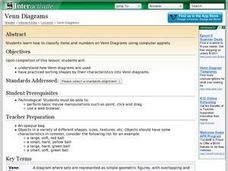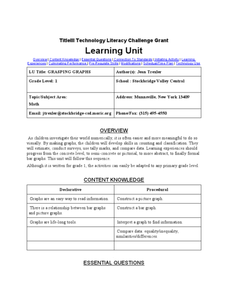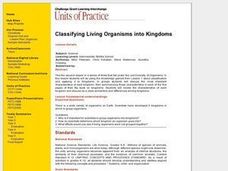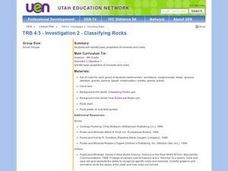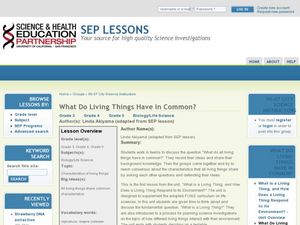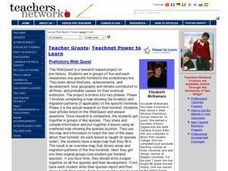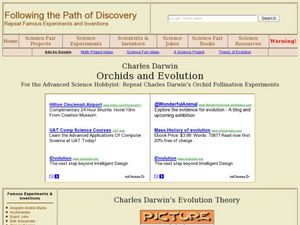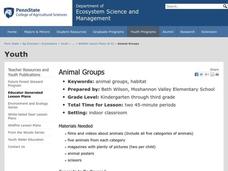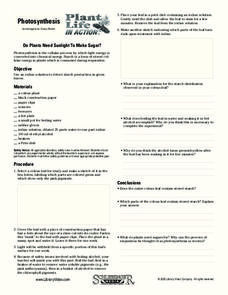Curated OER
U.S. History: de Soto's Alternate Route
Eighth graders examine various maps associated with Hernando de Soto's expedition. By comparing their textbook maps with newer maps, they answer a battery of focus questions. Using Microsoft Word, 8th graders answer the questions...
Curated OER
Classifying Living Things
Students identify how to classify living things. They classify various concepts including family members, kinds of clothing, numbers, shapes, and vocabulary words. They discuss how to classify various concepts and classify pictures of...
Curated OER
Venn Diagram and Shape Sorting Lesson Plan
Students use Venn diagrams to represent classifications of shapes and to use counting arguments to find the number of objects in a given set.
Curated OER
Technology Literacy Challenge Grant Learning Unit
First graders explore counting and classification. They sort leaves, create graphs, write sentences for the data in the graphs, develop graphs for shapes, favorite animals, birthdays, and participate in a die prediction game.
Curated OER
An Automobile Phylogenetic Tree
Students construct a phylogenetic tree for various automobiles and trucks after considering important characteristics of these "organisms". They work in small groups to construct the trees and complete a set of questions then they...
Curated OER
Classification of Pasta, Rice and the Nine Planets
Eighth graders create a classification system of the planets and give a written rational for their choice of categories. In this investigative lesson students participate in an activity that helps them to explore classification.
Curated OER
Secret Codes
Students examine Morse code and how it is used. In this secret codes lesson students decode messages, make their own codes and have other students crack the code.
Curated OER
Cell Cycle Duration
Students examine the cell cycle and how its duration can vary. In this cells lesson students complete a worksheet and answer questions.
Curated OER
Classification
Students gather and classify samples of a given item (rocks, fossils, seeds, etc.) They discuss various ways of classifying and that there are many different ways that are acceptable.
Curated OER
Animal Classification
Young scholars recognize the six groups of animals (Mammals, fish, birds, reptiles, amphibians and arthropods) and their characteristics. In this animal characteristics lesson, students sort animals by their traits. Young...
Curated OER
Classifying Living Organisms into Kingdoms
Learners create a flip book that describes the basic characteristics of the five main animal kingdoms. They research the animal kingdoms, include examples of organisms for each kingdom and illustrate the finished text.
Curated OER
Classify UT Plants and Animals
Students practice using 2 different plant classification keys to identify species. They make choices between the similarities and differences between their object and the classification scheme.
Curated OER
Classification Schemes
Young scholars place organisms into the correct classification and justify their reasoning. They must include all objects and have a reason for their decisions.
Curated OER
Investigation 2 - Classifying Rocks
Fourth graders identify basic properties of minerals and rocks. They access websites and utilize worksheets imbedded in this instructional activity to further their understanding of rock classification.
Curated OER
Shell Sort; Serving up Seafood
Students complete various small group activities to classify items and determine the types of combinations that can be made with these items. In the second lesson plan, students create menus for a restaurant to help them gain money sense...
Curated OER
Using a Flow Chart for Classification
In this flow chart learning exercise, students learn to use flow charts for classification of numbers, geometric shapes and animals. Students follow the directions and fill out flow charts to work out 20 answers. This is an online...
Curated OER
What Do Living Things Have In Common?
Learners explore the concept of classification. In this classification lesson, students collaborate to create lists of living thing similarities in order to differentiate between living and non-living things. Learners create a list of...
Curated OER
Prehistory Web Quest
Sixth graders identify how geography and climate determine the lives of early hominids, the characteristics of hunter-gatherer societies, how animals affected the lives of early hominids, and how hominids overcame their physical...
Curated OER
Orchids and Evolution
Students study Charles Darwin's evolutionary theory and how he applied it to orchids. In this evolution lesson students repeat Darwin's orchid pollination experiment.
Curated OER
Ten Important Hardwoods
Middle schoolers discuss ten important Pennsylvania hardwood trees, examine characteristics of each tree species, evaluate economic and ecological importance of hardwood trees, and recognize at least two characteristics of each species.
Curated OER
Evolution: Natural Selection
Young scholars analyze and discuss the evolutionary history of dinosaurs. In this investigative lesson students monitor different organisms in the environment and analyze the pressures that affect the chances of survival.
Curated OER
The Biosphere
For this biosphere worksheet, students identify the different levels of organization that ecologists study. Students complete charts, sentences, and answer short answer questions.
Curated OER
Animal Groups
Learners explore animal groups. For this animal science lesson, students use pictures from magazines and classify the animals into five categories. Learners share why they categorized the animals the way they did.
Curated OER
Photosynthesis
In this photosynthesis worksheet, middle schoolers follow the steps to complete a science investigation and then respond to 8 short answer questions regarding the photosynthesis investigation.
Other popular searches
- Scientific Process Skills
- The Scientific Process
- Scientific Process Observe
- Scientific Process Food
- Scientific Process Bridges
- Scientific Process Measure
- Scientific Process Lab
- Scientific Process Vitamin C
- Science Scientific Process




